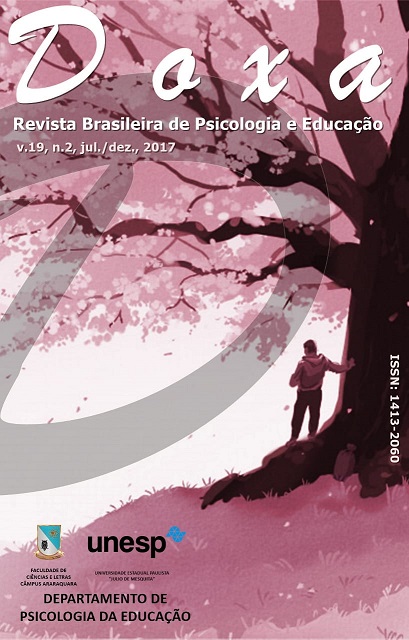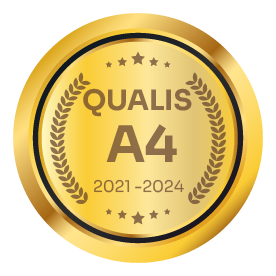Composition writing at school: what teachers say and silence about
DOI:
https://doi.org/10.30715/rbpe.v19.n2.2017.10914Keywords:
Composition. Writing. Students. Teachers.Abstract
The concern with writing at elementary school instigated us to carry out a large study to investigate elementary school teachers’ discourse about their students related to composition writing, that is, how teachers imagine their students’ writing processes. Our corpus is selected from an ample field of discourse. Discursive sequences of reference were selected from cut-outs from written statements by approximately thirty elementary school teachers from Brazilian public schools. This investigation adopts the perspective of French Discourse Analysis, the Socio-Historical Theory of Literacy, Freud and Lacan’s Psychoanalysis and in the Science of Education. Our results show that: a) teachers focus more on what they imagine to be students’ flaws and gaps of knowledge, and less on students’ cumulated knowledge; b) teachers do not see themselves as professionals capable of dealing with what they presume to be students’ difficulties related to writing; c) some students’ oral discourse is not acknowledged nor valued by teachers; d) teachers imagine some students to be at level zero of literacy as they start their schooling. We believe there can be a teachers’ subscription into a discursive formation which allowed them to imagine their students as subjects who start school with some literacy background. With that in mind, teachers might develop a teaching practice considering discursive memory, students’ memories and their meanings, leading them to identify with their original meanings. We see it as urgent that narrative discourse is incorporated to teaching practices and contents in elementary schools. Among other possibilities, the narrative discourse allows students to express their subjectivity. That is a fundamental condition to make sense of their own discourse, from the perspective of historicized-interpreter, and to become authors of their own speech. We believe that pre-service courses for teachers have an important role in offering writing experience for those learning to teach. We advocate the mastering of knowledge related to writing encourages differentiation among students, assuring them greater participation in social practices.
Downloads
References
COURTINE, J. J. Definition d’orientations théoriques et construction de procédures en anlyse du discours. Philosophiques, Montreal, v. 9, n. 2, p. 239-264, 1982.
COURTINE, J. J. Analyse du discours politique. Language, Paris, v. 62, p. 09-128, 1981.
GINZBURG, C. Sinais: raízes de um paradigma indiciário, In: GINZBURB, C. Mitos, emblemas, sinais: morfologia e história. São Paulo: Companhia de Letras, 1989. p. 143-179.
KLEIMAN, A. B. Os significados do letramento: uma nova perspectiva sobre a prática social da escrita. São Paulo: Mercado de Letras, 1995.
ORLANDI, E. P. Análise de discurso: princípios e procedimentos. Campinas: Pontes, 1999.
ORLANDI, E. P. As formas do silêncio no movimento dos sentidos. São Paulo: Ed. da UNICAMP, 1992.
ORLANDI, E. P. A linguagem e seu funcionamento São Paulo: Pontes, 1987.
PÊCHEUX, M. Semântica e discurso: uma crítica à afirmação do óbvio. São Paulo: Ed. da UNICAMP, 1995.
PÊCHEUX, M.; FUCHS, C. A propósito da análise automática do discurso: atualização e perspectivas. In: GADET, F.; HAK, T. (Org.). Por uma análise automática do discurso. São Paulo: Ed. da UNICAMP, 1990. p. 163-252.
RICKES, S. M. A escritura como cicatriz. Educação e Realidade, Porto Alegre, n. 27, p. 51-71, jan./jun. 2002.
STREET, B. Literacy in theory and practice: Cambridge: Cambridge University Press, 1989.
TFOUNI, L. V. A dispersão e a deriva na constituição da autoria e suas implicações para uma teoria de letramento. In: SIGNORINI, I. (Org.). Investigando a relação oral/escrito e as teorias do letramento. São Paulo: Mercado de Letras, 2001. p. 77-94.
TFOUNI, L. V. Letramento e alfabetização: colocações para uma reflexão sobre distúrbios de aprendizagem. Revista Psicopedagogia, [S.l.], v. 14, n. 32, p. 41-44, 1996.
TFOUNI, L.V. Letramento e alfabetização. São Paulo: Cortez, 1995.
TFOUNI, L.V. A escrita: remédio ou veneno? In: AZEVEDO, M. A.; MARQUES, M. L. (Org.). Alfabetização hoje. São Paulo: Cortez, 1994. p. 51-69.
TFOUNI, L.V. Letramento e analfabetismo. 1992. Tese (Livre-docência) – Faculdade de Filosofia, Ciências e Letras, Universidade de São Paulo, Ribeirão Preto, 1992.











